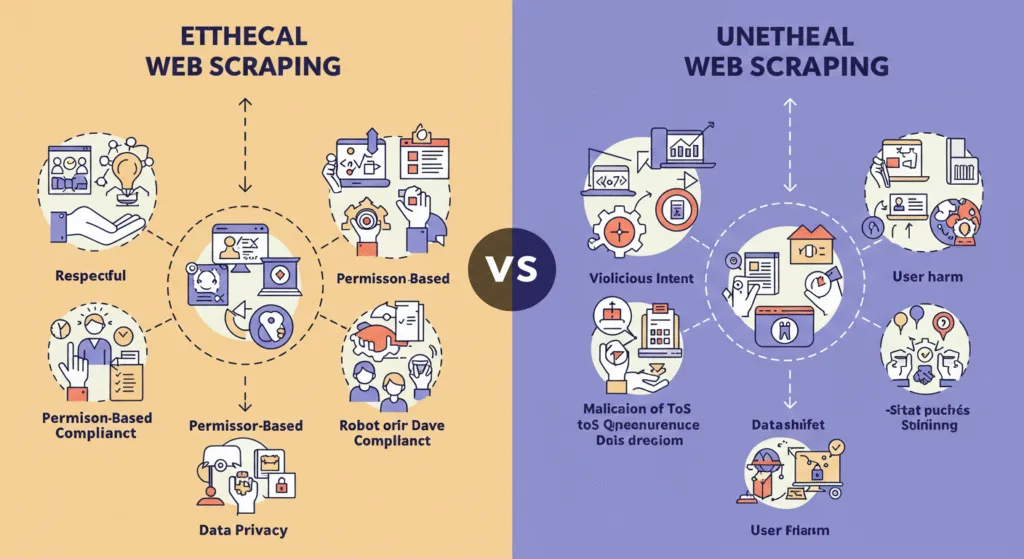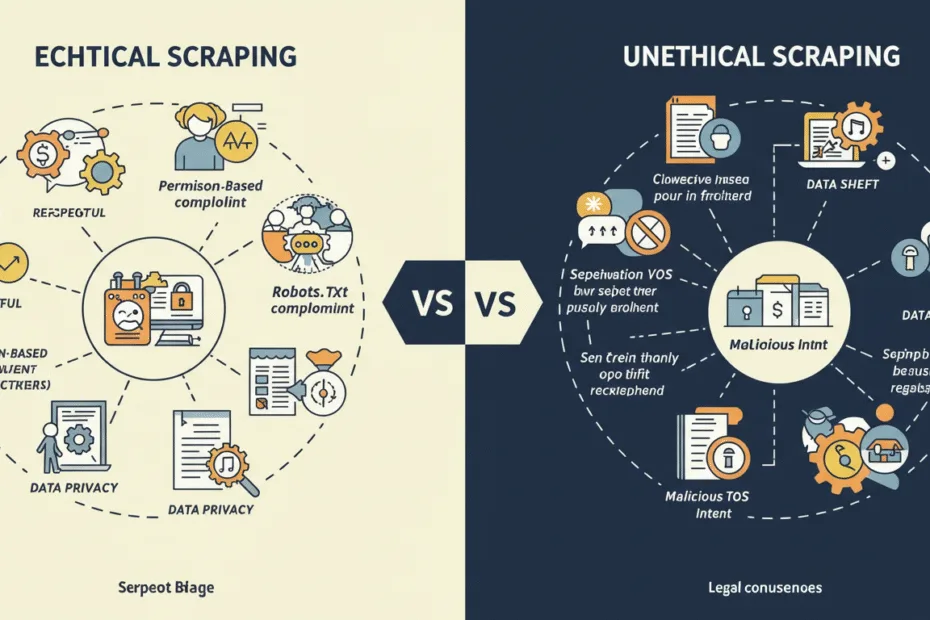As powerful as web scraping is, it must be approached with care—especially when it comes to legal compliance and ethical responsibility.
In this section, we’ll explore whether web scraping is legal, how to respect website policies, what ethical guidelines to follow, and how to avoid common pitfalls that could lead to bans, lawsuits, or reputational damage.
⚖️ Is Web Scraping Legal?
The legality of web scraping isn’t black and white—it depends on several factors including jurisdiction, type of data, and how that data is used.
✅ Generally Legal:
- Publicly available data scraped for research, education, or market analysis.
- Data extracted from public APIs or open datasets.
- Non-commercial use, especially in academic or journalistic contexts.
❌ Often Illegal:
- Scraping private, password-protected, or subscription-based content without permission.
- Violating Terms of Service (ToS) of a website.
- Collecting personally identifiable information (PII) in violation of GDPR, CCPA, or other privacy laws.
- Reproducing or reselling copyrighted content without authorization.
📌 Important Note: In the U.S., the Computer Fraud and Abuse Act (CFAA) and recent court rulings like hiQ Labs v. LinkedIn have shaped legal interpretations. While some cases support public data scraping, others penalize unauthorized access.
🌐 International Perspective: In the EU, GDPR imposes strict rules on collecting personal data, making many scraping activities legally risky unless proper consent mechanisms are in place.
📜 Understanding Website Policies
Before scraping any site, always check the following:
1. robots.txt
Located at example.com/robots.txt, this file tells crawlers which pages can or cannot be accessed.
Example:
User-agent: *
Disallow: /admin/
Allow: /👉 Use tools like Google Search Console or scrape responsibly by respecting these directives.
2. Terms of Service (ToS)
Most websites include clauses that restrict automated access. For example:
“You agree not to reproduce, duplicate, copy, sell, resell or exploit for any commercial purposes, any portion of the Services.”
Violation of ToS can lead to IP bans, cease-and-desist letters, or even lawsuits.
3. Copyright Notices
Some sites explicitly prohibit copying their content. Be cautious about scraping articles, product descriptions, or images protected by copyright.
🧭 Ethical Web Scraping Practices
Even if scraping is technically allowed, it should be done ethically to protect both the scraper and the target website.
Here are key principles to follow:
✔️ Respect Server Load
Avoid overwhelming a server with too many requests in a short time. Use delays (time.sleep() in Python) between requests.
✔️ Rotate IPs and Use Proxies
Prevent IP blocking by rotating user agents and using residential proxies or cloud services like Bright Data or ScrapeOps.
✔️ Identify Your Bot
Set a custom User-Agent header so the site owner knows who’s accessing their site.
Example:
headers = {
'User-Agent': 'Mozilla/5.0 (compatible; MyBot/1.0; +https://yourwebsite.com/bot )'
}✔️ Avoid Sensitive Data
Do not scrape PII, login credentials, or financial data unless explicitly authorized.
✔️ Don’t Break the Law
Ensure your actions comply with local and international regulations such as:
- GDPR (EU)
- CCPA (California, USA)
- COPPA (Children’s Online Privacy Protection Act)
✔️ Honor opt-out Mechanisms
If a site provides an opt-out option for data collection (e.g., Do Not Track), honor it.
In this section, we’ll explore whether web scraping is legal, how to respect website policies, what ethical guidelines to follow, and how to avoid common pitfalls that could lead to bans, lawsuits, or reputational damage.
🛑 Common Ethical Violations to Avoid
| Unethical Behavior | Why It’s Harmful |
|---|---|
| Excessive request rate | Can crash or slow down servers |
| Scraping private data | Violates privacy laws |
| Ignoring robots.txt | Disregards website owner preferences |
| Misrepresenting identity | Can lead to security concerns |
| Reselling scraped data | May violate copyright or ToS |

🧱 Legal Consequences of Improper Scraping
Improper or unethical scraping can lead to:
- IP Blocking or CAPTCHA Triggers
- Legal Action (e.g., lawsuits over ToS violations or data misuse)
- Reputational Damage (if caught scraping unethically)
- Fines under GDPR or CCPA (for mishandling personal data)
📌 Real-World Example:
In 2017, hiQ Labs was sued by LinkedIn for scraping public professional profiles. The case went to court, where the U.S. Supreme Court ultimately ruled in favor of hiQ, reinforcing the idea that public data scraping may be lawful, but only if done ethically and within bounds.
🔐 Best Practices for Legal and Ethical Scraping
Follow these golden rules to stay compliant and responsible:
✅ Always review robots.txt and Terms of Service
✅ Use rate limiting and delays between requests
✅ Rotate IPs and set proper headers
✅ Don’t store or distribute sensitive data
✅ Seek permission when necessary
✅ Monitor changes in legal frameworks (GDPR, etc.)
Related Article:
Related Article:
Part 1: Web Scraping ! The Ultimate Guide for Data Extraction
Part 2: Web Scraping! Legal Aspects and Ethical Guidelines
Part 3: Web Scraping! Different Tools and Technologies
Part 4: How to Build Your First Web Scraper Using Python
Part 5: Web Scraping Advanced Techniques in Python
Part 6: Real-World Applications of Web Scraping
